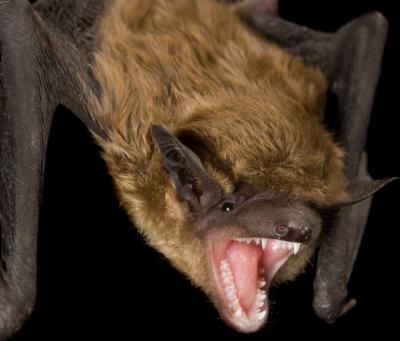 By Staff
By Staff
August 4th, 2022
BURLINGTON, ON
Covid19, then Monkey Pox, then close to unbearable weather and now bats have been found in Oakville with rabies.

Just seeing one of these would case death by fright
Halton Region Public Health confirmed that a bat tested positive for rabies. The bat was found in the West Oakville neighbourhood, south of Speers Road and east of Fourth Line. This is the first confirmed case of animal rabies in Halton Region this year.
Rabies is a viral disease that causes severe damage to the brain and spinal cord and, if untreated before symptoms appear, can lead to death.
The virus is spread through the saliva of an infected animal such as a raccoon, skunk, bat, dog, fox, or other wild animal, usually through a bite or scratch. Rabies illness in humans can be prevented by the use of a rabies vaccine, which is extremely effective, but only if it is administered before symptoms occur.
Although rabies in bats is rare, bites from rabid bats have caused almost all human cases of rabies in Canada over the past several years. Bats have small, needle-like teeth, and their bites easily go undetected. If you have been bitten, scratched or exposed to bat saliva, wash any wounds thoroughly with soap and water and seek medical attention immediately.
It is not always possible to identify if a bat has rabies, however rabid bats may move slowly, lose the ability to fly, remain active during daylight hours or be unresponsive to loud noises. If you find a bat in your home, do not attempt to move it and contact your local Animal Control Services.
There are a number of ways you can protect your family and pets from rabies:
• Wash bite or scratch wounds from any animal with soap and water and seek medical attention immediately.
• Report all animal bites or scratches to Halton Region Public Health by calling 311.
• Warn your children to stay away from any wild, stray or aggressive animals.
• Do not touch, feed or move wildlife, including young, sick or injured animals.
• Avoid animals that are behaving strangely.
• Do not keep wild animals as pets.
• Do not touch dead or sick animals.
• If you find a stray animal, report it to your local Animal Control Services.
• Make sure your pet’s rabies vaccinations are up to date.
• Keep your pet on a leash when off your property.
• Have your pet seen by a veterinarian if it has come in contact with a bat or other wild animal.
• Animal-proof your home by filling any holes that could allow animals to enter.


















